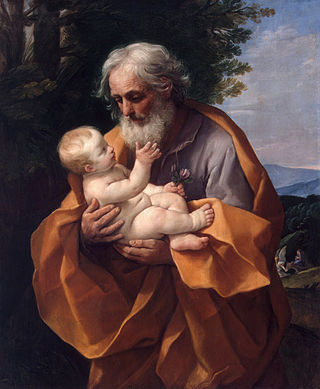
Matthew 1:25 is the twenty-fifth and last verse of the first chapter of the Gospel of Matthew in the New Testament. Joseph has awakened from a dream in which an angel gave him instructions about the birth of Jesus. He has taken Mary into his home, completing their marriage, and this verse explains what occurs once the couple is united.

Matthew 2:5 is the fifth verse of the second chapter of the Gospel of Matthew in the New Testament. The magi have informed King Herod that they had seen portents showing the birth of the King of the Jews. Herod has asked the leading Jewish religious figures about how to find out where Jesus was to be born. In this verse they tell him.

Matthew 4:1 is the first verse of the fourth chapter of the Gospel of Matthew in the New Testament. This verse opens the section in Matthew dealing with the temptation of Christ by Satan. Jesus has just been baptized by John the Baptist; in this verse he is led out into the wilderness.

Matthew 4:2 is the second verse of the fourth chapter of the Gospel of Matthew in the New Testament. This verse is just preceding the section in Matthew dealing with the temptation of Christ by Satan. Jesus has been led out into the wilderness, and in this verse he fasts.
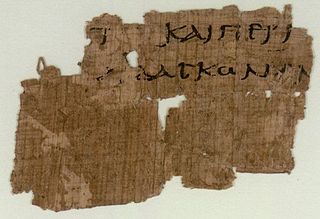
Matthew 4 is the fourth chapter of the Gospel of Matthew in the New Testament of Christian Bible. Many translations of the gospel and biblical commentaries separate the first section of chapter 4 from the remaining sections, which deal with Jesus' first public preaching and the gathering of his first disciples.

Matthew 4:3 is the third verse of the fourth chapter of the Gospel of Matthew in the New Testament. This verse opens the section in Matthew dealing with the temptation of Christ by Satan. Jesus has been fasting for forty days and forty nights, and in this verse the devil gives Christ his first temptation by encouraging him to use his powers to get food.
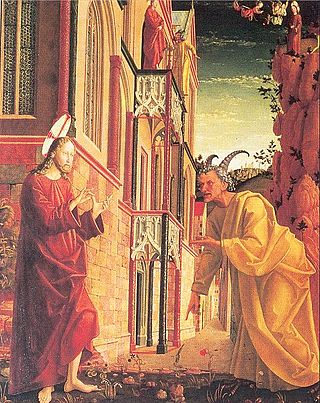
Matthew 4:5 is the fifth verse of the fourth chapter of the Gospel of Matthew in the New Testament. Jesus has just rebuffed Satan's first temptation, and in this verse the devil transports him to the site of the second temptation.

Matthew 4:6 is the sixth verse of the fourth chapter of the Gospel of Matthew in the New Testament. Jesus has just rebuffed "the tempter's" first temptation; in this verse, the devil presents Jesus with a second temptation while they are standing on the pinnacle of the temple in the "holy city" (Jerusalem).

Matthew 4:7 is the seventh verse of the fourth chapter of the Gospel of Matthew in the New Testament. Satan has transported Jesus to the pinnacle of the Temple of Jerusalem and told Jesus that he should throw himself down, as God in Psalm 91 promised that no harm would befall him. In this verse, Jesus quotes scripture to rebuff the devil.
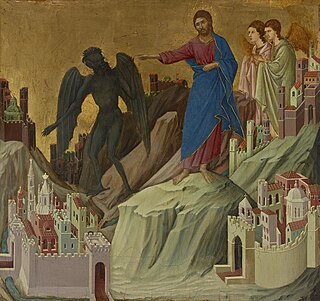
Matthew 4:8 is the eighth verse of the fourth chapter of the Gospel of Matthew in the New Testament. Jesus has just rejected Satan's second temptation. In this verse the devil transports Jesus to a new location for the third temptation.
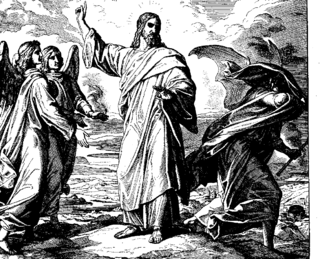
Matthew 4:10 is the tenth verse of the fourth chapter of the Gospel of Matthew in the New Testament. Jesus has rebuffed two earlier temptations by Satan. The devil has thus transported Jesus to the top of a great mountain and offered him control of the world to Jesus if he agrees to worship him. In this verse, Jesus rejects this temptation.

Matthew 4:11 is the eleventh verse of the fourth chapter of the Gospel of Matthew in the New Testament. Jesus has just rebuffed Satan's third temptation and ordered him away. In this last verse of the temptation scene, the devil departs and Jesus is serviced by angels.

Matthew 6:13 is the thirteenth verse of the sixth chapter of the Gospel of Matthew in the New Testament, and forms part of the Sermon on the Mount. This verse is the fifth and final one of the Lord's Prayer, one of the best known parts of the entire New Testament.

Matthew 5:1 and Matthew 5:2 are the first two verses of the fifth chapter of the Gospel of Matthew in the New Testament. The verses introduce the Sermon on the Mount that will be recited in the next several chapters. The previous chapter concluded with large crowds "from Galilee, and from the Decapolis, Jerusalem, Judea, and beyond the Jordan" who followed Jesus to witness him healing: these verses present Jesus as seeing the crowds and going up onto a mountain to begin teaching.
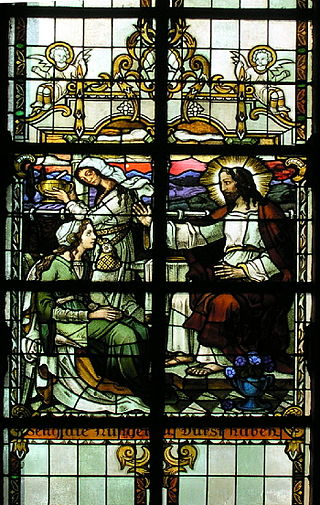
Matthew 5:6 is the sixth verse of the fifth chapter of the Gospel of Matthew in the New Testament. It is the fourth verse of the Sermon on the Mount, and also the fourth of what are known as the Beatitudes.

Matthew 5:33 is the thirty-third verse of the fifth chapter of the Gospel of Matthew in the New Testament and is part of the Sermon on the Mount. This verse is the opening of the fourth antithesis, beginning the discussion of oaths.

The temptation of Christ is a biblical narrative detailed in the gospels of Matthew, Mark, and Luke. After being baptized by John the Baptist, Jesus was tempted by the devil after 40 days and nights of fasting in the Judaean Desert. At the time, Satan came to Jesus and tried to tempt him. Jesus having refused each temptation, Satan then departed and Jesus returned to Galilee to begin his ministry. During this entire time of spiritual battle, Jesus was fasting.

Luke 4 is the fourth chapter of the Gospel of Luke in the New Testament of the Christian Bible, traditionally attributed to Luke the Evangelist, a companion of Paul the Apostle on his missionary journeys. This chapter details Jesus' three temptations, the start of his "Galilean Ministry", and his rejection at Nazareth, which Luke contrasts with his acclaim in nearby Capernaum.

Matthew 7:9 is the ninth verse of the seventh chapter of the Gospel of Matthew in the New Testament and is part of the Sermon on the Mount. This verse presents the first of a pair of metaphors explaining the benefits of prayer.

Matthew 7:21 is the twenty-first verse of the seventh chapter of the Gospel of Matthew in the New Testament and is part of the Sermon on the Mount. This verse continues Jesus' warning against false prophets.




















